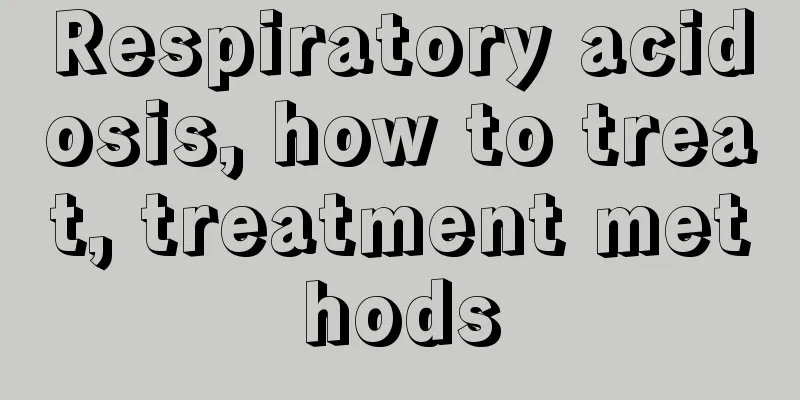Respiratory acidosis, how to treat, treatment methods

|
Some poisonings are not caused by one's own fault, but are caused by inadvertent exposure to some chemical substances during work and life. Therefore, everyone pays great attention to rescue work after poisoning, because every minute and every second is a fight with death. Decompensated respiratory acidosis will make many people at a loss, and they don't know what caused the poisoning for a moment. They need to go to the hospital for examination and treatment as soon as possible. Metabolic acidosis It is more common in clinical practice and is caused by excessive fixed acid (H+) produced by metabolism in the body or excessive loss of alkaline bicarbonate (reduced HCO-3), both of which are metabolic acidosis. Symptoms include irritability, and in severe cases, coma, deep and cool breathing, cherry-red lips, and a pale and gray face. If pH is less than 7.35, treatment should first improve circulation, correct hypoxia, and supplement alkaline drugs. Although there is metabolic acidosis in the rescue of diabetic coma, correction of acidosis should be put after replenishing fluids, electrolytes, insulin, and glucose. Ketone body production stops, and the original ketone bodies in the body are metabolized into CO2 and NaHCO3 and excreted through the lungs and kidneys. When the pH is still less than 7.1~7.2 after self-regulation, NaHCO3 can be supplemented at 1/2~2/3 of the calculated amount. Rescue during shock is due to abnormal fluid distribution caused by microcirculatory disorders, reduced effective circulating blood volume, and tissue hypoxia producing metabolic acidosis. It is necessary to correct acidosis and expand volume at the same time. Therefore, the first batch of fluid replacement can be 1.4% NaHCO3 solution, 20 ml/kg intravenous infusion within 1/2~1 hour. When metabolic acidosis is obvious, 5% NaHCO3 3-5 ml/kg or 11.2% sodium lactate 2-3 ml/kg can be injected intravenously. When conditions permit, the amount of alkali supplementation can be calculated according to the following formula: ① 5% NaHCO3 ml = (40-x) × 0.5 × body weight (kg), x is CO2P (carbon dioxide binding power); ② 11.2% sodium lactate ml = (40-x) × 0.3 × body weight (kg); ③ alkali supplement mmol = (BE-3) × 0.3 × body weight (kg). BE is the standard alkali excess. 5% NaHCO3 1 ml = 0.6 mmol, 11.2% sodium lactate 1 ml = 1 mmol, diluted into isotonic solution, and can be transfused undiluted in case of severe acidosis. However, its usage should be 1/2~2/3 of the calculated amount to avoid overcorrection. Respiratory acidosis It is common in clinical practice. Due to poor ventilation, CO2 retention occurs, and the partial pressure of arterial carbon dioxide (PaCO2) is >9.33 kPa. The patient manifests himself as listless and having difficulty breathing. When PaCO2 is >16 kPa, he may become unconscious and have convulsions. His skin is flushed, his lips are bright red, his limbs are warm, his conjunctiva is congested and edematous, and his HCO-3 is elevated. The HCO-3 level is L for patients with a course of disease <3 days and ≤45 mmol/L for patients with a course of disease >3 days. His blood chloride level is slightly low and his blood potassium level is slightly high. Treatment should improve ventilation and use low-concentration, low-flow oxygen inhalation (FiO2 <40%, 1~2 L/min) to accelerate CO2 exhalation. |
<<: What to do if you are poisoned by glyphosate
>>: Why are my thighs so thick
Recommend
Can mulberry leaves lower blood sugar?
Mulberry leaf is a relatively common plant in tra...
Under what circumstances can lung cancer not be treated surgically?
Under what circumstances can lung cancer not be t...
What causes tinnitus and dizziness
Health is something that deserves everyone's ...
How to pour liquid foundation into the cushion
Liquid foundation and air cushion are two insepar...
How to avoid infection with tampons
Internal tampons have always been loved by profes...
How to resolve the conflict between the Tiger and the Snake
Each of us has an animal sign. The year we were b...
It hurts when bitten by a flying ant
After a flying ant bites you, a red bump will app...
What are the developmental standards for a four-month-old baby?
When the baby is four months old, parents can sta...
Contraindications of hemodialysis
For some patients with renal failure, it is very ...
Can beans be put in the refrigerator?
Beans are rich in protein, so many people like to...
What are the benefits of soaking cobra in wine
As we all know, the five poisonous animals can al...
Nose is bloodshot due to long-term pinching
The nose is our respiratory channel. In order to ...
What are the hazards of common teratomas
What are the hazards of common teratomas? Teratom...
What are the common symptoms of prostate cancer?
Prostate cancer is a common cancer that seriously...
How to quickly recover from a broken hand?
When winter comes, the skin around people's h...









